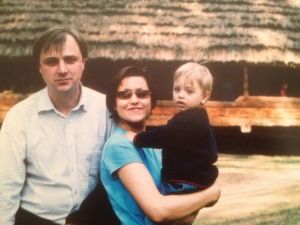Opinion
Voice of Ukraine in Denmark: Alarm clocks don’t wake you up for school anymore
Luka Perehinets
This article is more than 3 years old.

Pictured here in happier times with his parents, it’s safe to say that Luka’s childhood has come to an abrupt end
As the world scrambles to give its undivided attention to Ukraine and its people, Putin’s assault on European democracy carries on.
On March 16, I took a break from schoolwork to watch the speech President Zelensky made in his address to the US Congress.
As he finished his speech, a video was shown depicting the damage done to the country – namely, the extreme destruction of residential buildings, deliberate targeting of schools and hospitals by missile strikes, thousands dead and millions fleeing – and the response of the audience was heavy in tears.
Tears good, actions better
While Putin’s Napoleon complex soars, the cultural heritage of Ukraine and, indeed, Ukrainian identity at large, are under threat.
The children of Ukraine no longer require alarm clocks to wake up for school – that is, if their schools are even standing still. Or if they’re even able to get to their schools safely.
As my cousins report on life in the middle of a war zone, the uncertainty of their future has never been greater, and this poses a question: what’s next?
As a kid, you grow up dreaming about the future, what it holds, and the opportunities ahead of you. Yet that has been taken away from the children of Ukraine, some of whom are now wearing military-grade bulletproof vests, while others make Molotov cocktails. Growing up has never been such a necessity, but they don’t have a choice.
Mothers dying, Kremlin lying
The case of Mariupol, a city in eastern Ukraine, and the current barrage it is sustaining under Russian missile attack has revealed the nature of Russian invaders as not only conquering but bloodthirsty.
On March 9, after Russian Foreign Ministry spokesperson Maria Zakharova claimed everyone had been evacuated from the city’s third biggest hospital, the very same (and very populated) hospital came under siege, resulting in mothers taking a breath for the last time, and their newborns never seeing the light of day.
In Denmark everyone has access to healthcare, so no-one ever has to consider the cost of their health. Pregnant women go to hospitals to give new life, but the mothers of Ukraine will never get that chance now.
With no access to clean water, and no access to electricity, it’s a new kind of dystopia.
Refugees acceptance
In comparison to the standard asylum system, Denmark has opened the channels of possibilities for Ukrainian refugees with a special ‘Ukrainian Law’ to help Ukrainians get integrated into their temporary new homes.
With just over 3 million refugees already spread across Europe, and countries accepting them so eagerly, this raises questions regarding the other refugees, for whom such laws have never been enacted, and opportunities have been denied.
As a person from Ukraine who is not used to being part of a group in need of a home so desperately, the disparity is clear, and the need for equality amongst refugees is crucial.
War cannot be purified
Europe must understand that it can help Ukraine prevent the number of already existing Ukrainian refugees from growing by providing assistance in the fight to stop the Russian expansionist project, not delay it.
Ukraine stands, and the morale is stronger than ever. The question now is how long can it last?

About
Luka Perehinets
Luka is an 18-year old Ukrainian student living in Copenhagen who studies at the Copenhagen International School in pursuit of a degree in neuroscience. Over the last 18 years, he’s lived in four different countries: the United States, Russia, Ukraine and Denmark. In 2017 his family moved from Kyiv to Copenhagen due to his father’s employment at the World Health Organization. Luka has a younger brother and an older sister, who studies history and politics at the University of Edinburgh. In his free time, he enjoys spending time with his family and engaging in an in-depth analysis of scientific journals regarding the nervous system as well as a variety of sports. With a rich knowledge of Ukrainian history, Luka has been able to analyse the current events in Ukraine from a wider perspective.










































